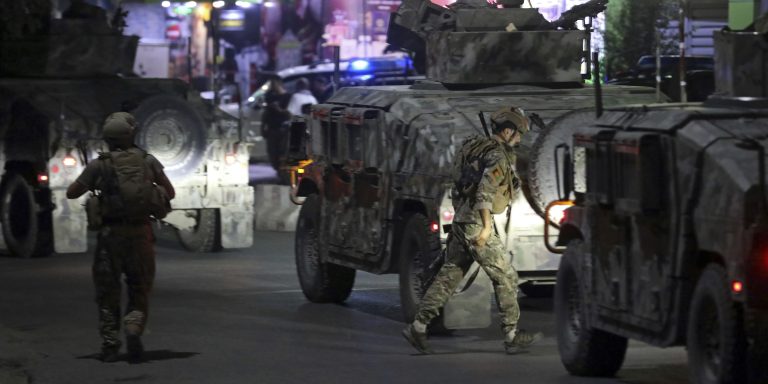INTELBRIEF
August 4, 2021
IntelBrief: Kabul Rocked by Massive Attack as Violence in Afghanistan Surges

Bottom Line Up Front
- Kabul was rocked by a massive car bomb and gunfire near the “Green Zone,” on Tuesday, close to the Defense Minister’s home and foreign embassies.
- No group has yet claimed responsibility, but as the only group believed to be capable of such an attack, many believe the Taliban is the perpetrator.
- In a show of support for the Afghan government and security forces, Afghan civilians took to the streets shouting “Allahu Akbar,” with some carrying Afghan flags.
- In previous weeks, Taliban fighters have overrun parts of northern Afghanistan and could now look to consolidate control over provincial capitals and major cities.
Afghanistan’s capital, Kabul, was rocked Tuesday evening by a massive vehicle borne improvised explosive device (VBIED) and running gun battles, including near the “Green Zone,” a heavily fortified area where government ministries and foreign embassies are located. Bismillahi Mohammadi, the Afghan Defense Minister, was targeted in an attack near his house, although he escaped unscathed. Three people were killed and ten other individuals were wounded in the attack, with that number expected to grow. The blast led to chaos, with families and young people scattering from nearby shops and cafes to avoid the fallout. Firefights broke out near the homes of Afghan politicians and lawmakers. Targeting Afghan politicians is a deliberate strategy used regularly by the Taliban to destabilize the government and convince civilians that only the Taliban can keep them safe.
No group has yet claimed responsibility, but there is widespread speculation that the Taliban is behind the attack, as it is the only group believed to be capable of such a spectacular attack in the heart of Kabul. The Islamic State Khorasan Province (ISKP) has also launched attacks in Kabul, but, as State Department spokesperson Ned Price noted, Tuesday night’s attack bore “all the hallmarks of the spate of Taliban attacks that we have seen in recent weeks.” Moreover, many of ISKP’s attacks are focused on sectarian targets, including a devastating attack on a maternity ward in May 2020. According to NBC News, three Taliban members claimed the group was responsible, on the condition of anonymity. The attack could be a direct response to recent U.S. airstrikes in support of the Afghan National Defense and Security Forces (ANDSF). Clashes between Taliban insurgents and Afghan forces have been growing in frequency and intensity since the United States announced it would withdraw its remaining troops back in April.
In a show of defiance to the Taliban and support for the Afghan government and security forces, hundreds of Afghan civilians took to the streets shouting “Allahu Akbar,” with some members of the crowd carrying Afghan flags. Similar scenes unfolded last week in Herat, a province in western Afghanistan, in a sign that Afghan civilians are angered by the Taliban’s capture of territory throughout the country. For some civilians, Tuesday’s attacks were seen as retribution for their shows of support for national forces and a post-Taliban vision of Afghanistan. On Monday, Afghan President Ashraf Ghani was highly critical of what he labeled an “abrupt” U.S. withdrawal and noted that the Biden administration bore some responsibility for the uptick in violence since the withdrawal announcement in April. U.S. Secretary of State Antony Blinken reached out to Ghani following the attack in Kabul, and a readout of the conversation released by the State Department noted that the U.S. reiterates its strong and enduring commitment to the security of Afghanistan and condemns the recent attacks.
Earlier this week, the Afghan Army asked residents to leave Lashkar Gah, the capital of Helmand province, in advance of an army offensive designed at routing the Taliban. As fighting between Afghan forces and the Taliban ramps up in parts of Afghanistan’s south and west, civilians are being caught in the crossfire. The UN Assistance Mission in Afghanistan (UNAMA) itself was also attacked in Herat some days ago, and received some criticism from Afghan commentators that the condemnation of Taliban attacks on the compound was not replicated for attacks on Afghan civilians, though the mission has since expressed “deepening concern for Afghan civilians” in a statement on social media. In previous weeks, Taliban fighters have overrun parts of northern Afghanistan and are now looking to consolidate control over other strategic territory, and could potentially look to begin seizing provincial capitals next, including Kandahar. The Taliban might try to attack jails and prisons where its fighters are held in an attempt to free high-value militants. The group’s fighters have also established checkpoints throughout the country and sought to control border crossings with both Iran and Pakistan.